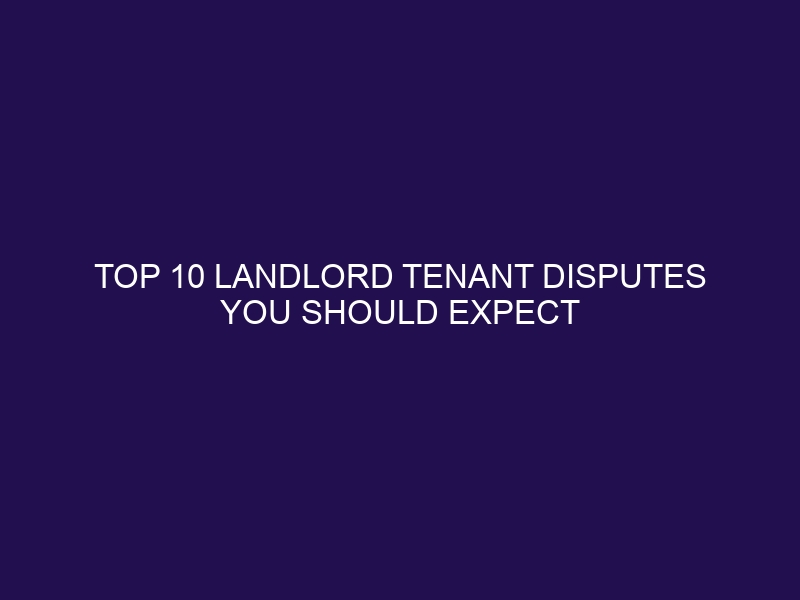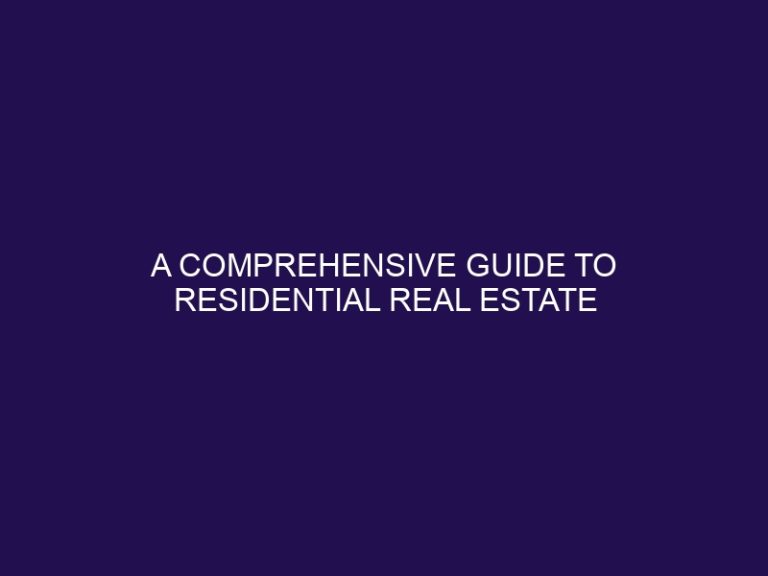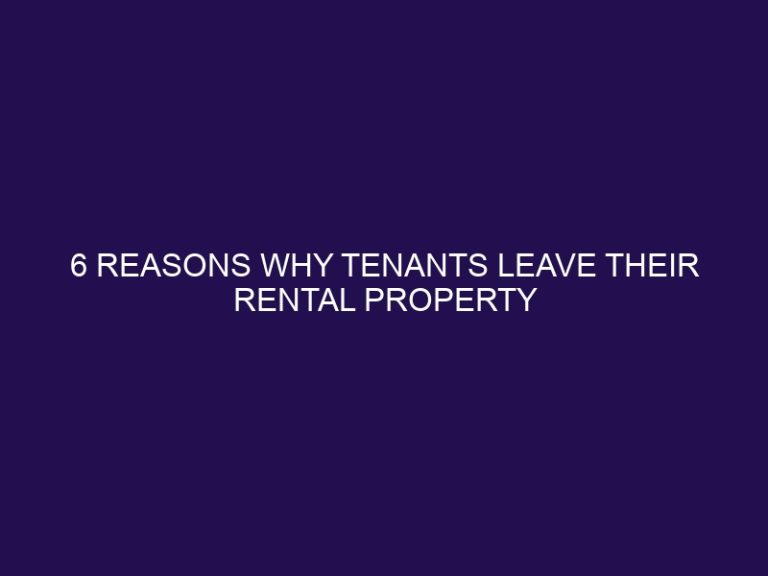Top 10 Landlord Tenant Disputes You Should Expect
Understanding Landlord-Tenant Disputes
Landlord-tenant disputes are a common occurrence in the realm of rental properties. These disputes arise when disagreements and conflicts arise between the landlord and the tenant regarding various aspects of their rental agreement and living arrangements. It is important to understand what exactly constitutes a landlord-tenant dispute and the reasons behind their occurrence.
Landlord-tenant disputes can encompass a wide range of issues, such as non-payment of rent, security deposits, lease violations, maintenance and repairs, noise complaints, unauthorized pets, subletting and unauthorized occupants, property damage, evictions, and privacy and harassment concerns. Each of these disputes poses unique challenges and requires careful resolution in order to maintain a harmonious landlord-tenant relationship.
To effectively address these disputes, it is crucial to employ strategies to resolve conflicts and find mutually beneficial solutions. Open communication between the landlord and tenant is essential, along with a thorough review of the lease agreement. Mediation or arbitration can be sought to facilitate discussions and reach a resolution, while legal advice may be necessary in more complex cases. Documenting everything and understanding local laws and regulations can further aid in resolving disputes. In some cases, taking the dispute to court may be the final course of action.
By understanding the nature of landlord-tenant disputes and implementing appropriate strategies, both landlords and tenants can effectively navigate these challenges and maintain a positive and amicable rental relationship.
Understanding Landlord-Tenant Disputes
To ensure a smooth rental experience, landlords and tenants must have a clear understanding of landlord-tenant disputes. These disputes can include issues such as non-payment of rent, problems with the security deposit, concerns regarding property maintenance, violations of the lease agreement, and even eviction disputes. By familiarizing themselves with the rights and responsibilities outlined in the rental agreement and local laws, both parties can take proactive measures to prevent or resolve these conflicts. Effective communication, proper documentation, and seeking legal assistance when necessary are all crucial in achieving a positive resolution. To prevent disputes from escalating, it is highly beneficial for landlords and tenants to maintain open and prompt communication, addressing any concerns that may arise.
What Are Landlord-Tenant Disputes?
What Are Landlord-Tenant Disputes?
Landlord-tenant disputes refer to conflicts that arise between landlords and tenants regarding various aspects of their rental agreement. These conflicts can stem from factors such as non-payment of rent, issues with the security deposit, violations of the lease agreement, concerns about maintenance and repairs, complaints about noise, unauthorized pets, subletting, property damage, evictions, as well as privacy and harassment concerns. In order to resolve these disputes, it is crucial to maintain open communication. Additionally, it is helpful to carefully review the lease agreement, consider seeking mediation or arbitration, document all relevant information, and have a clear understanding of local laws and regulations. If necessary, taking the dispute to court can be an option. Nevertheless, if the conflict cannot be resolved through negotiation, it is advisable for both parties to seek legal advice.
Why Do Landlord-Tenant Disputes Occur?
Why Do Landlord-Tenant Disputes Occur?
Landlord-tenant disputes occur for various reasons, often stemming from misunderstandings, breaches of lease agreements, or conflicts between parties. Some common causes include non-payment of rent, security deposit disputes, lease violations, maintenance and repair issues, noise complaints, unauthorized pets, and subletting. Disagreements regarding property damage, evictions, privacy, and harassment can also lead to disputes. Factors such as miscommunication, differing expectations, and lack of knowledge about tenants’ rights and landlord responsibilities contribute to the occurrence of these conflicts. It is crucial for both landlords and tenants to understand their legal obligations and communicate openly to prevent and resolve disputes.
Top 10 Landlord-Tenant Disputes
When it comes to landlord-tenant disputes, there are certain hotspots that tend to arise more frequently than others. These top 10 conflicts touch on a range of issues that can disrupt the harmony between landlords and tenants. From non-payment of rent to property damage, unauthorized pets to privacy concerns, this section will dive into the various sub-sections of these disputes. Get ready to uncover the most common challenges and conflicts that both landlords and tenants should expect to encounter along the way.
1. Non-Payment of Rent
- Non-payment of rent is a common issue that often arises between landlords and tenants.
- To tackle this problem effectively, both parties need to take certain steps:
- Ensure that the terms and due dates for rent payments are clearly stated in the lease agreement. This will help prevent confusion and disputes related to non-payment of rent.
- Landlords should send timely reminders to tenants who are late with their rent payments, emphasizing the importance of prompt payment.
- Tenants should maintain open communication with their landlords and inform them in advance if they anticipate difficulties in making timely rent payments.
- If all else fails and non-payment persists, landlords may have to resort to legal action, such as eviction proceedings, to enforce payment of overdue rent.
By following these steps, both landlords and tenants can address the issue of non-payment of rent in a fair and efficient manner.
2. Security Deposits
When it comes to landlord-tenant disputes, security deposits are a common area of contention. Here are some key factors to consider when dealing with security deposits:
- Understanding the purpose: Security deposits are collected by landlords to cover any damages to the rental property beyond normal wear and tear.
- Knowing the legal requirements: Familiarize yourself with local laws regarding the maximum allowable amount for a security deposit and the timeframe for its return.
- Documentation is crucial: Take photos and create a detailed move-in and move-out checklist to document the condition of the rental unit.
- Communication is key: Discuss any potential deductions from the security deposit with your landlord before moving out to address any concerns.
- Follow proper procedures: Ensure that you provide a forwarding address to your landlord so that they can send the security deposit refund within the designated timeframe.
Fact: In the US, the average security deposit is equivalent to one month’s rent.
3. Lease Violations
When dealing with lease violations, it is crucial to follow these steps to address and resolve the issue:
-
Review the lease agreement to understand the specific terms and conditions that have been violated.
-
Communicate directly with the tenant to discuss the lease violations and the necessary actions to rectify the situation.
-
If the lease violations persist, consider mediation or arbitration as an alternative to court for resolving the dispute.
-
Seek legal advice from a professional specializing in landlord-tenant disputes to ensure a clear understanding of your rights and obligations.
-
Document all communication and evidence related to the lease violations, including dates, times, and relevant documentation.
-
Familiarize yourself with local laws and regulations concerning lease violations to ensure appropriate action.
-
If all other attempts fail, you may need to resort to court to seek a legal resolution for the lease violations.
4. Maintenance and Repairs
When it comes to maintenance and repair issues in landlord-tenant disputes, both parties need to be aware of their responsibilities. Here are some key points to keep in mind:
– Landlords have an obligation to promptly address maintenance and repair requests to ensure the property remains habitable.
– Tenants should report any maintenance or repair issues to their landlords in a timely manner to prevent further damage.
– It is important for both landlords and tenants to maintain open communication and keep a record of all conversations regarding maintenance and repairs.
– If an agreement cannot be reached, tenants can consider mediation or seeking legal advice to resolve the issue.
– Pro-Tip: To effectively resolve disputes, it is helpful for both landlords and tenants to keep a record of all maintenance and repair requests, including dates, communication, and any actions taken.
5. Noise Complaints
Noise complaints can be a common issue in landlord-tenant disputes. They occur when tenants are disturbed by excessive noise from neighbors or even from the landlord themselves. These noise complaints can be a big hurdle that tenants face. However, these disputes can be effectively dealt with by following a simple process that involves open communication, reviewing the lease agreement, and seeking legal advice if necessary. Mediation or arbitration can also be useful in finding a compromise. Understanding local laws and regulations regarding noise complaints is vital in resolving such issues. Ultimately, if all else fails, tenants may have to take the noise complaint dispute to court to seek a resolution.
6. Unauthorized Pets
- Unauthorized pets can be a common cause of disputes between landlords and tenants. Here is a list of considerations regarding unauthorized pets:
- Landlord’s policies: Before bringing a pet into a rental property, tenants should carefully review their lease agreement to understand whether pets are allowed.
- Consequences: Violating a “no pets” policy may result in penalties, such as fines or eviction.
- Allergies and damages: Landlords may have valid reasons for not allowing pets, including potential allergies or concerns about property damage.
- Open communication: If tenants want to have a pet, it’s important to discuss this with the landlord and seek their permission.
- Alternative solutions: Some landlords may consider allowing pets with additional fees or a pet agreement that outlines responsibility for damages and potential pet-related issues.
True story: A tenant named Sarah got a new puppy without prior permission from her landlord. The landlord discovered the unauthorized pet during an inspection and gave Sarah a warning. Sarah apologized, agreed to pay an additional pet deposit, and signed a pet agreement that addressed all concerns. The open communication and compromise allowed Sarah to keep her pet while also respecting the landlord’s policies.
7. Subletting and Unauthorized Occupants
- Review the lease agreement to determine if subletting is allowed.
- If subletting is not allowed, communicate with the tenant and address the issue. Explain the terms of the lease and the consequences of subletting without permission.
- If the tenant continues to sublet without authorization, send a written notice stating the violation and the action required to remedy the situation.
- If the tenant fails to comply, consider legal action such as eviction or terminating the lease agreement.
- To prevent unauthorized occupants, conduct regular inspections to ensure that only approved tenants are living in the property.
- Document all interactions and violations with the tenant to support your case in the event of legal action.
- Consult with a lawyer specializing in landlord-tenant disputes to understand your rights and options.
A landlord discovered that his tenant was subletting the property without permission. After reviewing the lease agreement, the landlord communicated with the tenant, explaining the violation and the consequences of subletting without authorization. Despite repeated warnings, the tenant continued to sublet. The landlord sought legal advice and ultimately proceeded with eviction, ensuring that unauthorized occupants were removed from the property.
8. Property Damage
When it comes to property damage, both landlords and tenants need to understand how to effectively handle this issue in landlord-tenant disputes. Here are some steps to address property damage disputes:
- 1. Assess the extent of the property damage by thoroughly inspecting it and documenting it.
- 2. Notify the responsible party, whether it is the landlord or tenant, about the damage and provide them with the evidence.
- 3. Engage in open dialogue and negotiation to communicate about the matter and attempt to reach a resolution.
- 4. If the responsible party agrees, make arrangements for the necessary repairs and discuss reimbursement for the incurred costs.
- 5. If an agreement cannot be reached, consult legal professionals to understand your rights and explore options for further resolution.
9. Evictions
Evictions are a frequent and daunting aspect of landlord-tenant disputes. Resolving eviction issues necessitates careful consideration and adherence to the appropriate legal processes. Here are nine steps to effectively navigate evictions:
Fact: According to a recent study, eviction rates remain high, affecting millions of renters each year in the United States alone.
10. Privacy and Harassment
Tenant privacy and harassment rank among the top 10 issues that often arise between landlords and tenants. It is crucial for both parties to have a clear understanding of their rights and responsibilities pertaining to privacy and harassment matters. Here are several practical steps to effectively address this dispute:
- Promote open communication: Engage in a productive discussion with the landlord or tenant to address any concerns regarding privacy or harassment.
- Thoroughly review the lease agreement: Ensure that the lease explicitly includes provisions that safeguard privacy and prevent harassment.
- Consider mediation or arbitration: Explore alternative methods of dispute resolution to reach a fair and satisfactory solution.
- Seek legal advice if necessary: If the issue persists, it is advisable to consult with a lawyer who specializes in landlord-tenant disputes.
- Maintain meticulous documentation: Keep detailed records of any incidents or conversations related to privacy or harassment.
- Familiarize yourself with local laws and regulations: Understand the applicable laws in your area that govern privacy and harassment issues.
- Resorting to legal action: If all other attempts fail, taking the dispute to court may become necessary to achieve a resolution.
In a real-life scenario, a tenant experienced multiple unauthorized entries by their landlord into the rented apartment. The tenant confronted the landlord, providing evidence of such privacy violations. With the guidance of a lawyer, the tenant successfully negotiated a new lease agreement that included robust provisions to protect privacy and ensure advance notice for entry requirements.
How to Solve Landlord-Tenant Disputes
Solving landlord-tenant disputes can be a challenging task, but with the right approach, it is possible to find resolutions that work for both parties involved. In this section, we will uncover effective strategies to address these disputes head-on. From open communication and reviewing lease agreements to considering mediation or seeking legal advice, we’ll explore various paths towards resolution. We’ll emphasize the importance of documenting everything, understanding local laws, and, if needed, taking the dispute to court. Let’s navigate through these practical steps to tackle landlord-tenant conflicts and ensure a harmonious living arrangement.
1. Open Communication
Open communication is absolutely crucial in resolving landlord-tenant disputes. Tenants should initially reach out to their landlord to effectively express their concerns or grievances. This enables both parties to openly discuss the issue, comprehend each other’s perspectives, and ultimately discover a mutually agreeable solution. Implementing open communication can effectively prevent misunderstandings and minimize the escalation of conflicts. For instance, in one specific case, a tenant encountered issues with noisy neighbors. However, by effectively communicating with their landlord, they were able to promptly address the problem and consequently find a satisfactory resolution that beneficially satisfied both parties involved. Ultimately, practicing open communication actively fosters a positive landlord-tenant relationship and essentially lays the crucial foundation for amicably resolving any future disputes.
2. Reviewing the Lease Agreement
When dealing with landlord-tenant disputes, it is crucial to thoroughly review the lease agreement. Here are the steps you should follow:
-
Review the lease agreement thoroughly to understand your rights and responsibilities.
-
Note any clauses or terms that may be causing the dispute.
-
Consult a legal expert to ensure accurate interpretation of the lease.
-
Gather evidence, such as emails or photographs, to support your position.
-
Communicate with your landlord and make an effort to reach a mutual agreement.
-
If necessary, consider mediation or arbitration as a means to resolve the dispute.
-
Keep in mind that local laws and regulations can affect the outcome of the dispute.
Taking the time to carefully review the lease agreement can help prevent misunderstandings and potential disputes. It is worth noting that lease violations are one of the top reasons for landlord-tenant disputes, according to a survey.
3. Mediation or Arbitration
- Choose Mediation or Arbitration: Both parties must agree to participate in either mediation or arbitration.
- Select Mediator or Arbitrator: A neutral third party is chosen to facilitate the process.
- Present Opening Statements: Each party presents their side of the dispute.
- Engage in Discussion and Negotiation: The mediator or arbitrator guides the conversation to help both parties find a mutually acceptable solution.
- Achieve an Agreement: If successful, a mutually agreed-upon resolution is reached.
- Create Documentation: The agreement is put in writing and signed by both parties.
- Fact: Mediation or arbitration has a high success rate, with over 70% of disputes being resolved without going to court.
4. Seeking Legal Advice
When facing a landlord-tenant dispute, it is crucial to seek legal advice. Consulting with a lawyer who specializes in landlord-tenant law can provide valuable insights and guidance throughout the process. A legal professional can assess the situation, review lease agreements, and advise on the best course of action. They can also help negotiate a resolution, represent you in mediation or arbitration, or even take the dispute to court if necessary. Remember, seeking legal advice can make a significant difference in protecting your rights and ensuring a fair outcome. Pro-tip: Prioritize finding an experienced attorney who understands local laws and regulations.
5. Documenting Everything
When it comes to landlord-tenant disputes, it is absolutely essential to document everything in order to safeguard your rights and have concrete evidence if it becomes necessary. Here are critical steps to follow while documenting:
- Keep a record: Maintain an extensive log of all relevant interactions, conversations, and incidents.
- Take photos/videos: Capture any property damage or issues as visual evidence.
- Save correspondence: Retain copies of all written communication, including emails, letters, and text messages.
- Keep receipts: Organize and store receipts for rent payments, repairs, or any other financial transactions.
- Get witnesses: If possible, have witnesses present during discussions or inspections and request them to provide written statements if needed.
In a specific case, a tenant encountered the threat of eviction due to alleged unauthorized pets. However, by diligently documenting every single interaction and collecting statements from neighbors who had witnessed no presence of pets, the tenant was able to effectively establish their innocence and peacefully resolve the dispute.
6. Understanding Local Laws and Regulations
Understanding local laws and regulations is vital for both landlords and tenants in the process of resolving disputes. This essential knowledge ensures that both parties are well-informed about their rights and responsibilities according to the law. Landlords must become acquainted with the local regulations regarding eviction procedures, rent control, and property maintenance standards. On the other hand, tenants should have a clear understanding of their rights concerning lease agreements, security deposits, and privacy protections. Getting familiar with these laws can effectively avoid misunderstandings and facilitate the prompt resolution of conflicts through open communication or, if necessary, mediation, arbitration, or legal action. In order to strengthen their case when dealing with landlord-tenant disputes, it is crucial for individuals to document all interactions and seek legal advice.
7. Taking the Dispute to Court
If you are unable to resolve a landlord-tenant dispute through open communication, reviewing the lease agreement, or seeking mediation or arbitration, you may need to take the dispute to court. Here are the steps you can take:
- Consult an attorney who specializes in landlord-tenant disputes.
- Gather all relevant documents and evidence to support your case.
- File a complaint with the appropriate court or housing authority.
- Prepare for the court hearing by organizing your arguments and evidence.
- Present your case in court, ensuring that you adhere to all court procedures and deadlines.
- Respond to any counterclaims or arguments presented by the opposing party.
- Wait for the court’s decision, which may involve a judgment or order.
- Follow any instructions or orders given by the court, such as paying damages or vacating the property.
- Taking the Dispute to Court: This is the final step in resolving a landlord-tenant dispute, where you present your case before a judge and await a decision.
Frequently Asked Questions
1. What are the different types of difficult tenants that can cause problems for landlords?
The different types of difficult tenants that can cause problems for landlords include non-payers, the skipper, overstays their welcome, wrecking balls, the open door, endless contention, litigious or “sue happy” tenants, unruly pet owners, party central, and lawbreakers.
2. How can landlords prevent tenants from not paying rent?
Landlords can prevent tenants from not paying rent by thoroughly screening applicants, verifying their income, and ensuring the rental rate is affordable for them. Accepting online rent payments and having solid rental agreements with clear language about rent payment and consequences for non-payment can also help. Following through on late fees and seeking eviction as a last resort are other options.
3. What can landlords do to protect themselves from tenants who skip out on the lease?
Landlords can protect themselves from tenants who skip out on the lease by having a legal lease agreement. Dealing with tenants who abandon the property without notifying the landlord can be challenging, but having a legal lease agreement can provide some recourse.
4. How can late or non-payment of rent be resolved?
Late or non-payment of rent can be resolved through effective communication. Landlords can negotiate a flexible payment plan or prorate late fees to assist tenants in financial hardship. Allowing tenants to find roommates or moving them to a cheaper unit can also be options.
5. What should landlords inform tenants about the use of security deposits?
Landlords should inform tenants that the security deposit cannot be used for rent. Including this information in the lease agreement is important. An alternative is collecting the first and last month’s rent separately from the security deposit.
6. How should landlords handle noise complaints from tenants?
If the noisy neighbor is not your tenant, there is little you can do. If both parties involved are your tenants, it is best to let them resolve the issue themselves. Including a clause in the agreement that requires tenants to resolve disputes on their own is recommended. If intervention is necessary, speak to the noisy tenant calmly but firmly. Restricting noise levels in the lease agreement is also important.


![How to start a property management company the right way [Canada]](https://rentincrease.ca/wp-content/uploads/2023/10/how-to-start-a-property-management-company-the-right-way-canada_2665-768x576.jpg)




